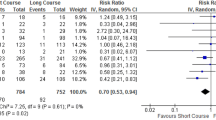Abstract
The treatment duration of acute uncomplicated pyelonephritis (AUP) is still under debate. As shortening treatment duration could be a means to reduce antimicrobial resistance, we aimed to establish whether 5 days of antibiotic treatment is non-inferior to 10 days in patients with AUP. We performed an open-label prospective randomized trial comparing 5 days to 10 days of fluoroquinolone treatment for AUP. The inclusion criteria were: female patients aged ≥18 years with clinical signs of urinary tract infection, fever >38 °C, and positive urinalysis. Patients were randomized to either 5 or 10 days of fluoroquinolone treatment. Outcome was cure at day 10 and day 30 after the end of treatment. One hundred patients were randomized and 12 were excluded after randomization. The mean ± standard deviation (SD) age was 31.8 ± 11 years old and the mean ± SD temperature was 38.6 ± 0.7 °C. The main bacterium involved was Escherichia coli (n = 86; 97.7%) and 3 (3.4%) patients had a positive blood culture. In the post-hoc analysis, clinical cure 10 days after the end of the treatment was 28/30 (93.3%) in the 5-day arm and 36/38 (94.7%) in the 10-day arm (p = 1.00). At day 30, the clinical cure rate was 23/23 (100%) in the 5-day arm and 20/20 (100%) in the 10-day arm (p = 1.00). The microbiological cure rate was 20/23 (87.0%) in the 5-day arm and 16/20 (80.0%) in the 10-day arm (p = 1.00). The efficacy of 5 days of fluoroquinolone treatment does not seem different from 10 days of treatment for AUP.


Similar content being viewed by others
References
Gupta K, Hooton TM, Naber KG, Wullt B, Colgan R, Miller LG et al (2011) International clinical practice guidelines for the treatment of acute uncomplicated cystitis and pyelonephritis in women: a 2010 update by the Infectious Diseases Society of America and the European Society for Microbiology and Infectious Diseases. Clin Infect Dis 52:e103–e120
Czaja CA, Scholes D, Hooton TM, Stamm WE (2007) Population-based epidemiologic analysis of acute pyelonephritis. Clin Infect Dis 45:273–280
Stamm WE, Hooton TM (1993) Management of urinary tract infections in adults. N Engl J Med 329:1328–1334
Hooton TM (2003) The current management strategies for community-acquired urinary tract infection. Infect Dis Clin North Am 17:303–332
Warren JW, Abrutyn E, Hebel JR, Johnson JR, Schaeffer AJ, Stamm WE (1999) Guidelines for antimicrobial treatment of uncomplicated acute bacterial cystitis and acute pyelonephritis in women. Infectious Diseases Society of America (IDSA). Clin Infect Dis 29:745–758
Sobel JD, Kaye D (2005) Urinary tract infections. In: Mandell GL, Bennett JE, Dolin R (eds) Principles and practice of infectious diseases. Elsevier, New York, pp 875–905
Sandberg T, Skoog G, Hermansson AB, Kahlmeter G, Kuylenstierna N, Lannergård A et al (2012) Ciprofloxacin for 7 days versus 14 days in women with acute pyelonephritis: a randomised, open-label and double-blind, placebo-controlled, non-inferiority trial. Lancet 380:484–490
Nicolle LE (2012) Minimum antimicrobial treatment for acute pyelonephritis. Lancet 380:452–453
Eliakim-Raz N, Yahav D, Paul M, Leibovici L (2013) Duration of antibiotic treatment for acute pyelonephritis and septic urinary tract infection—7 days or less versus longer treatment: systematic review and meta-analysis of randomized controlled trials. J Antimicrob Chemother 68:2183–2191
Peterson J, Kaul S, Khashab M, Fisher AC, Kahn JB (2008) A double-blind, randomized comparison of levofloxacin 750 mg once-daily for five days with ciprofloxacin 400/500 mg twice-daily for 10 days for the treatment of complicated urinary tract infections and acute pyelonephritis. Urology 71:17–22
Klausner HA, Brown P, Peterson J, Kaul S, Khashab M, Fisher AC et al (2007) A trial of levofloxacin 750 mg once daily for 5 days versus ciprofloxacin 400 mg and/or 500 mg twice daily for 10 days in the treatment of acute pyelonephritis. Curr Med Res Opin 23:2637–2645
Talan DA, Stamm WE, Hooton TM, Moran GJ, Burke T, Iravani A et al (2000) Comparison of ciprofloxacin (7 days) and trimethoprim–sulfamethoxazole (14 days) for acute uncomplicated pyelonephritis in women: a randomized trial. JAMA 283:1583–1590
van Nieuwkoop C, van’t Wout JW, Assendelft WJJ, Elzevier HW, Leyten EMS, Koster T et al (2009) Treatment duration of febrile urinary tract infection (FUTIRST trial): a randomized placebo-controlled multicenter trial comparing short (7 days) antibiotic treatment with conventional treatment (14 days). BMC Infect Dis 9:131
Acknowledgments
The authors thank the patients and Elodie Choisy. The authors also acknowledge Céline Vichot, greatly missed, for her help and dedication to this study.
Author information
Authors and Affiliations
Corresponding author
Ethics declarations
Ethical approval
The French National Agency for Medicines and Health Products Safety (no. A 8082062), the French Data Protection Agency, and the local ethics committee of Versailles University (Eudract 20086004571-22) approved the study protocol. The study was done in accordance with the ethical principles of the Declaration of Helsinki and the Guidelines for Good Clinical Practice. Written informed consent for participation in the trial was obtained from all patients.
Funding
This study was supported by the French Ministry of Health.
Conflict of interest
The authors declare that they have no competing interests.
Rights and permissions
About this article
Cite this article
Dinh, A., Davido, B., Etienne, M. et al. Is 5 days of oral fluoroquinolone enough for acute uncomplicated pyelonephritis? The DTP randomized trial. Eur J Clin Microbiol Infect Dis 36, 1443–1448 (2017). https://doi.org/10.1007/s10096-017-2951-6
Received:
Accepted:
Published:
Issue Date:
DOI: https://doi.org/10.1007/s10096-017-2951-6




